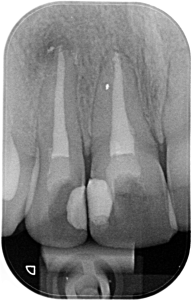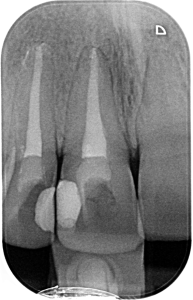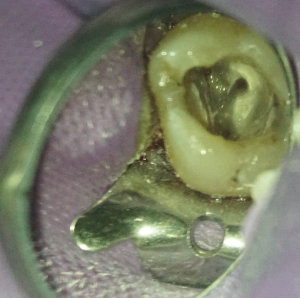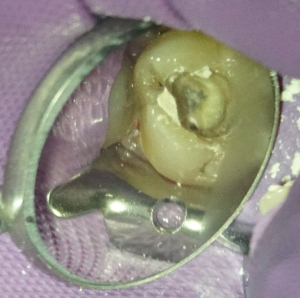Root Canal Treatment
What is root canal (Endodontic) treatment?
Root canal treatment is carried out to remove bacteria from the centre and root of a tooth which has become infected. Following removal of bacteria through cleaning and disinfection, the root can be filled and the surface sealed allowing healing of the tissues. Root canal treatment has changed greatly over the past 10 years and is a well-established, safe and predictable way to save a tooth.

How did my tooth get infected?
Natural bacteria live within our mouths and oral cavity. The skin of the mouth protects our body from these bacteria.
The outer hard structure of a tooth also acts as a barrier preventing bacteria from effecting the body. If this protective structure has been lost in historic or current tooth decay, tooth fracture, acid erosion or gum disease, bacteria can enter the inside of the tooth causing infection in the tooth root and jawbone. Teeth can also get infected following traumatic injuries.

What happens if the infection continues?
You may or may not experience pain when a tooth becomes infected, this depends on the amount and type of bacteria present within the tooth. Over time bacteria become more established and potent. This will eventually lead to symptoms which can include pain, swelling, abscess and tooth discolouration.
Without treatment, bone around the tooth will be destroyed which can lead to the tooth becoming increasingly loose and eventually lost. Bone destruction can also affect neighbouring teeth and effect the reliability of future treatment options. Signs of bone destruction caused by infection can be seen on dental x-rays.


What are my options?
There are only two options in effectively treating an infected tooth, root canal (endodontic) treatment or extraction. It is preferable to save a tooth where possible rather than having a tooth extracted and an artificial replacement. If a tooth is extracted a space can be left or the tooth replaced with a denture, bridge or dental implant.

Root canal treatment options.
Root canal is one of the most technically demanding treatments in dentistry. Although all dentists are trained to provide root canal treatment, some dentists specialise in root canal treatment having undertaken further training in this field. Some root treatment problems such as canal curvature, calcification or previous unsuccessful attempts at root filling will require the intervention of dentists with specialist skills. You may choose, or your dentist may recommend, to have a more routine root canal treatment completed to a specialist standard to maximise successful outcome.
Root canals are typically less than 1/10 of a millimetre in diameter and those who specialise in root canal treatment will use microscopes, advanced equipment and specialist techniques which increase the success of treatment when compared to that of a general dentist.


About Dr Gareth Thomas BDS, MFDS, MSc, MEndo, MRD Endo, PGC
Gareth completed a four-year training program culminating in a Master’s degree in Endodontics in 2015. Since this time his clinical practice has solely focused on root canal treatment, working as an NHS Speciality Dentist at The Royal London Hospital, Moriston Hospital & Brecon Hospital. In 2019 Gareth completed MEndo & MRD qualifications at the Royal College of Surgeons & was duly elected to the GDC specialist list in Endodontics. He is one of only 4 specialist endodontist working in referral practice in Wales & also teaches dentists & postgraduate students at USW & Kings College London.

What is the long term outcome for my tooth?
When completed to the ideal standard by dentists specialising in root canal treatment, success rates are above 80%. It is important that the surface structure of the tooth is properly repaired, protected and maintained by your general dentist following treatment to maximise long-term success.
Prior to root canal treatment, you will be invited to an examination appointment. The tooth will be thoroughly assessed to ensure a good prognosis is achievable and cost effective. Some teeth are found to have a problem which cannot be saved with root canal treatment. Unfortunately, in such situations the tooth will require extraction but can be replaced with an artificial tooth.
What does the treatment involve?
Providing root canal treatment to highest possible standard is time consuming and significant attention to detail is required. Simpler cases can be completed in a single visit which would typically take an hour and a half, more complex cases may take two visits of an hour and a half each. This is dependent on your particular case and will be discussed at your consultation appointment.
Treatment provided will be comfortable and pain free. A local anaesthetic will be used to numb the mouth. Following treatment there maybe some mild tenderness but nothing to disrupt your day-to-day routine. A post-operative instruction sheet will be given after treatment to advise aftercare.
Cost of root canal treatment.
Providing high quality root canal treatment is time consuming and requires expensive specialised materials, equipment and training. The cost of treatment ranges from £700 for a front tooth, and from £900 for a back tooth, depending on complexity. Following consultation, a precise cost of treatment will be given and a written report provided. Root canal treatment is nearly always cheaper than extraction and provision of a bridge or dental implant.
Price Guide:
- Consultation / Assessment – from £150
- Incisor / Canine Tooth – from £700
- Premolar Tooth – from £800
- Molar Tooth – from £900
Further information on root canal treatment can be found on the British Endodontic Society website:
www.britishendodonticsociety.org.uk/patient-public/further-information/
When you attend for consultation or treatment, I will be happy to discuss further any queries you may have.
Make a referral
To make a referral click on the button below to see our referral process
Make a Referral
